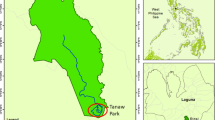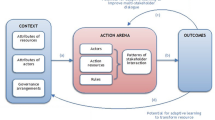Abstract
Faced with an extremely difficult economic situation following the loss of its major trade relations, a tightened U. S. blockade, and a world recession, Cuba has taken major steps towards building an ecological society. The major change in the orientation of development strategy that is now taking place requires a complex analysis that includes such long term general factors as the socialist commitment to developing science, the absence of a sector that profits from high tech agriculture or environmental degradation, and a receptivity to Marxist analysis of science combined with the development of a self confident and articulate ecological community and shorter term changes associated with “rectification”, a political swing to the left, and the present “Special Period”. Ecologists by conviction are joined by ecologists by necessity in introducing emergency measures that they hope will become permanent features of Cuban Society.
Similar content being viewed by others
References
Academia de Ciencias de Cuba.Resultados de la Ciencia y la tecnología. This report of the Academy of Sciences to the National Assembly of People's Power is undated, but the context places it around 1990.
Castro, Fidel. Speech at the 20th anniversary celebration of the Cuban Speleological Society, January 13, 1960.
——.Ciencia, Tecnología y Sociedad 1959–1989. Editora Politica. Habana, 1990.
Goldman, Marshall I.The Spoils of Progress: Environmental. Pollution in the Soviet Union. Cambridge, MA: M. I. T. Press, 1972.
Herrera, R., Leda Menendez, Maria E. Rodriguez, and Elisa E. Garcia (eds).Ecología de los Bosques Siempreverdes de la Sierra del Rosario, Cuba. Proyecto MAB #1, 1974–1987.
Khanga, Yelena.Soul to Soul: a Black Russian American Family 1865–1992. Norton, 1992.
Levins, R. and R. C. Lewontin.The dialectical Biologist. Cambridge, MA: Harvard University Press, 1985.
Levins, R. 1986. “Science and progress: Seven developmentalist myths in agriculture.”Monthly Review special summer issue, 1986.
Martiniez Viera, Rafael.Setenta años de la Estacíon Experimental Agronómica de Santiago de las Vegas. Academia de Ciencias, la Habana, 1977.
Sánez, Tirso and Emilio G. Capote.Ciencia y Tecnología en Cuba. Editorial CIencias Sociales. Havana, 1989.
Tablada, Carlos.El Pensamiento Economico de Ernesto Ché Guevara. Ediciones Casa de las Américas, Havana. 1987.
Additional information
Richard Levins is a former farmer in Puerto Rico turned ecologist and mathematical biologist, author ofEvolution in Changing Environments and coauthor with Richard Lewontin ofThe Dialectical Biologist and with Yrjö Haila ofHumanity and Nature. He has been working with Cuban ecology since the 1960s, and teaches at the New York Marxist School and Harvard School of Public Health.
Rights and permissions
About this article
Cite this article
Levins, R. The ecological transformation of Cuba. Agric Hum Values 10, 52–60 (1993). https://doi.org/10.1007/BF02217840
Issue Date:
DOI: https://doi.org/10.1007/BF02217840




